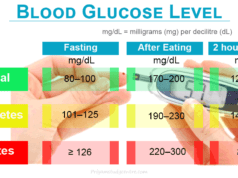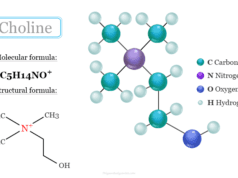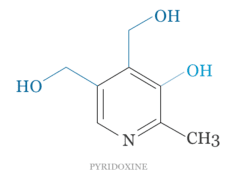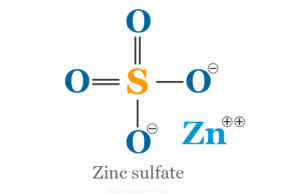List of B vitamins and Names
B vitamins are a list of water soluble vitamins that mainly help the body convert food into energy and synthesize hemoglobin. B vitamins are a list of eight essential nutrients found in various food sources and added to food items to maintain our good health. The dietary supplements that contain all eight B vitamins are named vitamin B complex. The list or names of B vitamins are vitamin B1 (thiamine), B2 (riboflavin), B3 (niacin, nicotinamide, nicotinamide riboside), B5 (pantothenic acid), B6 (pyridoxine, pyridoxal, pyridoxamine), B7 (biotin), B9 (folate or folic acid), and B12 (cobalamins). The list of B vitamins that we intake daily plays a vital role in maintaining good health and helps to support cell health, growth of red blood cells, growing energy levels, and proper nerve and brain functions.
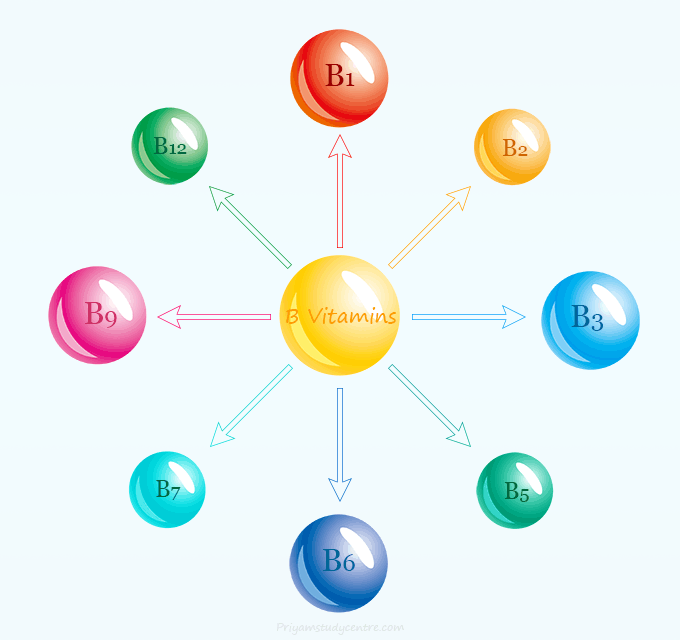
These are very important for women who are pregnant because vitamin B complex helps in fetal brain development and reduces the risk of birth defects.
B complex vitamins also play a key role in the making and activation of the hormone estrogen in our body. Low levels of B vitamins may reduce the levels of estrogen. Therefore, they can increase the risk of breast cancer in premenopausal women.
B Complex Vitamins List
Most of the B vitamins are found abundantly in meat, eggs, and dairy products. They are also available in plant products such as spinach, legumes, whole grains, asparagus, potatoes, bananas, chili peppers, and breakfast cereals but B12 is not abundantly available in plant products.
A list of vitamin B complexes and their important food sources are given below in the table,
| Vitamin | Name | Sources |
| Vitamin B1 | Thiamine | Peas, bananas, oranges, nuts, whole grain bread, liver, and some fortified breakfast cereals |
| Vitamin B2 | Riboflavin | Milk, eggs, fortified breakfast cereals, mushrooms, and plain yogurt |
| Vitamin B3 |
Niacin (nicotinic acid) | Red meat such as beef, beef liver, pork, poultry, fish, brown rice, nuts, seeds, legumes, and bananas |
| Nicotinamide | ||
| Nicotinamide riboside | ||
| Vitamin B5 | Pantothenic acid | Organ meats such as liver and kidney, chicken breast, mushrooms, avocado, nuts, seeds, and dairy milk |
| Vitamin B6 |
Pyridoxine | Pork, chicken or turkey, some fish, peanuts, soya beans, wheatgerm, oats, bananas |
| Pyridoxal | ||
| Pyridoxamine | ||
| Vitamin B7 | Biotin | Beef liver, cooked eggs, salmon, avocados, pork, sweet potato, nuts, and seeds |
| Vitamin B9 | Folate | Dark green leafy vegetables, beans, peanuts, sunflower seeds, fresh fruits, whole grains, liver, and seafood |
| Vitamin B12 | Cobalamins | Meat, fish, milk, cheese, eggs, and some fortified breakfast cereals |
Functions of B Vitamins
Vitamin B complexes are beneficial in maintaining good health because all of these vitamins directly impact your energy levels, brain function, and cell metabolism. Each B vitamin is either a cofactor or a precursor that is needed to maintain various biological processes in our body.
Functions of Thiamine
Thiamine is a coenzyme that is involved in the catabolism of sugars and amino acids. The main biological functions of this B vitamin may include,
- Thiamine plays an important role in the release of energy from carbohydrates.
- Vitamin B1 (thiamine) is involved in the production of RNA and DNA.
- Thiamine is an important B vitamin that is involved in nerve function.
- In metabolism, the active form of the coenzyme thiamine pyrophosphate (TPP) takes part in the conversion of pyruvate to acetyl coenzyme A.
Functions of Riboflavin
Vitamin B2 (Riboflavin) is an essential component of two major coenzymes, flavin mononucleotide (FMN) and flavin adenine dinucleotide (FAD).
- The coenzymes produced from FMN and FAD play an important role in energy production for cellular function, growth, and development.
- Riboflavin is essential for the metabolism of fats, drugs, and steroids.
- FAD is required for the conversion of the amino acid tryptophan to niacin or vitamin B3. Similarly, FMN is required for the conversion of vitamin B6 to the coenzyme pyridoxal 5’-phosphate.
- The B vitamin riboflavin helps to maintain normal levels of homocysteine, an amino acid in the blood.
Functions of Vitamin B3
All three forms of vitamin B3 are converted within the human body to the coenzymes nicotinamide adenine dinucleotide (NAD) and nicotinamide adenine dinucleotide phosphate (NADP). These coenzymes are required for human life but may not be formed without vitamin B3 or tryptophan. The main biological functions of vitamin B3 may include,
- All tissues in the body convert niacin into its main metabolically active coenzyme nicotinamide adenine dinucleotide (NAD) which is required to catalyze various biological reactions in the body.
- NAD obtained from niacin is converted to another active form of NADP. It is required to control most metabolic redox processes in human cells.
- NAD obtained from vitamin B3 transfers the potential energy in carbohydrates, fats, and proteins to adenosine triphosphate (ATP).
- It is also required for various critical cellular functions. It mainly maintains genome integrity, control of gene expression, and cellular communication.
Functions of Vitamin B5
Vitamin B5 (Pantothenic acid) is an essential form of B vitamin that helps to synthesize coenzyme A (CoA) and acyl carrier protein. Coenzyme A plays a vital role in synthesizing amino acids, fatty acids, ketone bodies, cholesterol, phospholipids, steroid hormones, neurotransmitters, and antibodies.
Functions of Vitamin B6
Vitamin B6 is one of the water-soluble B vitamins that contain six vitamers such as pyridoxal, pyridoxine, pyridoxal, pyridoxamine, and their respective 5’-phosphate esters. Pyridoxal 5’ phosphate (PLP) and pyridoxamine 5’ phosphate (PMP) are the two active forms of vitamin B6.
Like other B vitamins, it also helps our body to carry out various biological functions. The main functions may include,
- It helps to make antibodies that are needed to fight various viruses, infections, and diseases.
- Vitamin B6 helps to maintain normal nerve function.
- It helps to make hemoglobin that carries oxygen in the red blood cells to the tissues.
- It helps to break down proteins that we eat from various food sources.
- Vitamin B6 keeps your blood sugar or glucose levels normal.
Functions of Vitamin B7
Biotin is an essential B vitamin that catalyzes the metabolism of fatty acids, glucose, and amino acids. It also plays key roles in histone modifications, gene regulation, and cell signaling
We may not detect low levels of biotin by any medical test. It can be identified by its deficiency symptoms such as thinning hair and red scaly rash around the eyes, nose, and mouth. It is commonly used for treating hair thinning or loss, brittle nails, and other conditions. However, there is no good scientific evidence to support such uses.
Functions of Folate (Folic acid)
Folate (folic acid) is the natural form of vitamin B9 that is extremely beneficial for pregnant women or women planning a pregnancy. The most important functions of folate (folic acid) may include,
- It is an important nutrient that functions in the production of genetic materials such as DNA and RNA.
- It is essential when cells and tissues are growing rapidly such as in infancy, adolescence, pregnancy, and fetal development.
- Like other B vitamins, folic acid helps make red blood cells and maintain the work of iron in your body.
- It plays a key role in breaking down the amino acid homocysteine. High amounts of homocysteine may have harmful effects on our bodies.
- Folate is extremely crucial for the proper functioning of the brain and emotional health.
Functions of Vitamin B12
Vitamin B12 (cobalamin) is one of eight water-soluble B vitamins that help to maintain various biological functions in our bodies. They are also required for the proper growth and development of the human body. The main biological functions of vitamin B12 are,
- Vitamin B12 is a powerful neural compound that helps in the synthesis of neurotransmitters. Therefore, it may be the functioning of the brain and nerves in the human body.
- It is also required for the proper growth and development of the human body.
- Like most B vitamins, cobalamin is important in fatty acid and amino acid metabolism.
- It also plays an important role in DNA synthesis and regulation.
- Natural foods or supplements of vitamin B12 help to produce healthy red blood cells and prevent conditions like anemia.
- Daily intake of the B12 vitamin may reduce homocysteine levels in your blood. It is a protein that is responsible for damaging arterial walls and increases the risk of heart blocks and strokes.
Vitamin B Complex Supplements
Most B vitamins are found in various foods which we intake in our daily diet. However, we also use vitamin B supplements to maintain our good health. Each individual B vitamin supplement is referred to a specific number or name such as B1 for thiamine, B2 for riboflavin, B3 for niacin, B5 for pantothenic acid, etc.
All the B complex vitamins are the list of water-soluble vitamins that help to maintain our body. Therefore, they are dissolved in water and your body may not store them.
The supplementation of vitamin B complex is a common way to increase the levels of B vitamins. Most energy drinks contain high amounts of B vitamins to boost the energy levels of your body.
The supplementation (tablets or capsules) of B vitamins may also help to reduce stress, boost mood, and reduce symptoms of anxiety or depression. Always ask your doctor or healthcare provider before taking B vitamin supplements.
Daily Recommendations for B Vitamins
Each B vitamin has a specific daily recommendation and it varies depending on your sex, age, and other factors like pregnancy and breastfeeding. The RDA’s daily intake values for various B vitamins for women and men are listed below the table,
| Vitamin | Males | Females | During pregnancy | During breastfeeding |
| Vitamin B1 (thiamine) | 1.2 mg | 1.1 mg | 1.4 mg | 1.4 mg |
| Vitamin B2 | 1.3 mg | 1.1 mg | 1.4 mg | 1.6 mg |
| Vitamin B3 | 16 mg | 14 mg | 18 mg | 17 mg |
| Vitamin B5 | 5 mg | 5 mg | 6 mg | 7 mg |
| Vitamin B6 | 1.3 mg | 1.3 mg | 1.9 mg | 2.0 mg |
| Vitamin B7 | 30 mcg | 30 mcg | 30 mcg | 35 mcg |
| Vitamin B3 | 400 mcg | 400 mcg | 600 mcg | 500 mcg |
| Vitamin B3 | 2.4 mcg | 2.4 mcg | 2.6 mcg | 2.8 mcg |
According to the National Institutes of Health, the daily recommendation of B vitamins for men aged over 51 is 1.7 mg, and for females aged over 51 is 1.5 mg.
Frequently Asked Questions
What are B Vitamins?
B complex vitamins are a list of water soluble vitamins that mainly help the body convert food into energy and synthesize hemoglobin. B complex vitamins are a group of eight essential nutrients found in various foods and added to foods for our good health.
What are the names of all the B vitamins?
All B complex vitamins are the list of vitamins that are beneficial in maintaining good health because all of these directly impact your energy levels, brain function, and cell metabolism. The names of the eight B complex vitamins list are:
- Vitamin B1 (Thiamine)
- Riboflavin (Vitamin B2)
- Vitamin B3 (Niacin, Nicotinamide, Nicotinamide riboside)
- Pantothenic acid (Vitamin B5)
- Vitamin B6 (Pyridoxine, Pyridoxal, Pyridoxamine)
- Vitamin B7 (Biotin)
- Folate (Vitamin B9)
- Vitamin B12 (Cobalamins)
Why do we need B12 vitamin?
We need vitamin B12 (cobalamin) to maintain various biological functions in our bodies. It is also required for proper growth and development. Vitamin B12 helps to maintain the function of the brain and nerves, and proper growth and development. It also fatty acid and amino acid metabolism, DNA synthesis, and regulation, producing healthy red blood cells, preventing conditions like anemia, etc.
Do you need folate or folic acid when pregnant?
Yes, folate or folic acid is needed when you are pregnant because folic acid deficiency may cause neural tube defects in the fetus. Therefore, a high dose of folic acid is recommended in pregnancy to prevent birth defects.
What foods have the highest B12?
Foods obtained from animal origin are the only sources of vitamin B12 or cobalamin. The highest sources are liver, kidney, milk, curd, eggs, fish, pork, and chicken. Curd is a better source than milk due to the synthesis of one of B vitamins or B12 by Lactobacillus.

